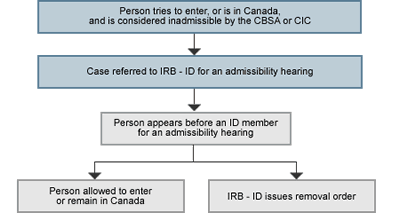At the request of the Canada Border Services Agency (CBSA), foreign nationals or permanent residents who are believed to have contravened the
Immigration and Refugee Protection Act (IRPA) appear before the Immigration Division (ID) of the Immigration and Refugee Board of Canada (IRB) for admissibility hearings. (In a limited number of cases, Citizenship and Immigration Canada (IRCC) may also request an admissibility hearing.)
A person may not be able to enter or remain in Canada if the
ID determines that he or she:
- has failed in some way to comply with
IRPA
- is a security threat
- has violated human or international rights
- has been involved in crime or organized crime
- has engaged in misrepresentation, such as claiming a false identity
- has a health condition (in some cases)
- does not have enough money to support him or herself, or
- is accompanying an inadmissible family member
In some cases, the
CBSA has the power to issue removal orders directly; that is, to send the person out of Canada, without requesting an admissibility hearing.
When the
CBSA requests an admissibility hearing, it also sends the
IRB a report. The report explains why it believes the person should not be allowed to enter or remain in Canada.
A member (decision-maker) will hear the review according to theIRBtribunal process. The process is adversarial. There are two opposing parties: the person believed to be inadmissible and Minister's counsel for the
CBSA (or for
IRCC). The admissibility hearing process is also public, so media or members of the public may attend or report on the proceedings
Minister's counsel will say why the person should not be allowed to enter or remain in Canada. The person, or his or her counsel, will respond. After considering all the evidence, the member makes a decision and then issues an order. The order either requires the person to leave Canada or allows the person to enter or remain in Canada. Terms and conditions may be imposed. If the person was in
detention, the member may order the person to remain in detention if he or she believes that the reasons for the original detention still stand.
In some cases, the person may be able to appeal the removal order to the Immigration Appeal Division (IAD) of the
IRB. In some cases, the person may be able to seek permission, or leave, of the
Federal Court for a judicial review of the
IRB's decision. Minister's counsel may also seek leave for judicial review.

[Alternate format]
The image illustrates a graph.
- Person tries to enter, or is in Canada, and is considered inadmissible by the
CBSA or
CIC.
- Case is then referred to
IRB -
ID for an admissibility hearing.
- Person appears before an
ID member for an admissibility hearing.
There are two possible outcomes:
- Person is allowed to enter or remain in Canada,
or -
IRB -
ID issues removal order.